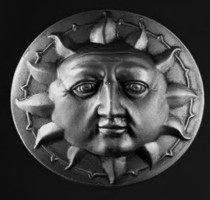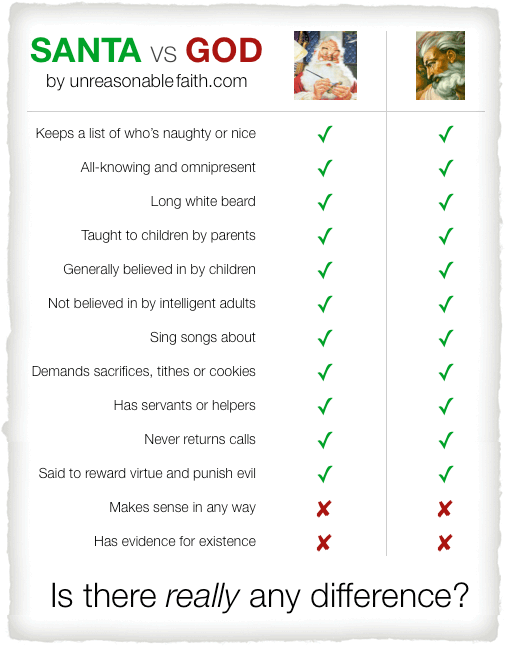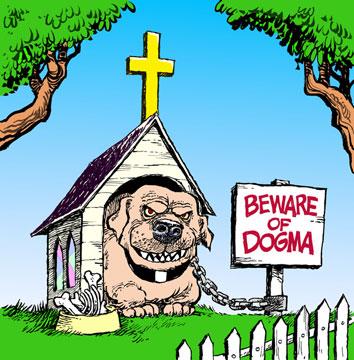
Dogma may be defined as established opinion, a doctrine put forth without evidence, or as a body of doctrines supported authoritatively by a church. But when you consider a combination of all three--an established opinion without evidence, supported by the authority of supernatural beliefs--you have a summation of everything that good science is opposed to. As it so happens, religion is the largest central distributor of dogma, but you can find it within other circles of opinion as well.
Theology is defined as "faith justified by reason." But this is another way of saying "A conclusion in search of a justification." This was the dominant philosophical approach of the dark ages, and it was this habit that kept them in the dark. Beliefs were fortified and communicated, supported only by citations of other beliefs, forming a circle of opinion with no means of objective correction. Theology remained a circle jerk, somewhat like partisan bloggers, who reinforce their mutual preconceptions by echoing them back and forth, referencing each other, accepting only what evidence confirms their beliefs and ignoring the rest (when they reference evidence at all.) This is the modus operendi of dogmatists, and it can become a prison which is difficult escape. This is what made science impossible in the dark ages, and it was only when a central dogmatic authority of the Catholic Church was shattered that science and philosophy could flourish.
This same hermetically sealed community of belief can also be found amongst political ideologues, proponents of various pseudo-sciences and occult dogmas, and amongst conspiracy theorists. Conspiracy theorists are notorious for this tendency to form communities of the deluded, for in their case the opinions they hold are often so outrageously wrong that conspiracists often appear genuinely insane. The internet has been instrumental in the rise of new conspiracy theories because it provides the opportunity to form the kind of closed, circular, and mutually reinforcing groupthink which was previously available only to close knit religious communities or tightly structured political groups. This means that conspiracists should be properly considered as a species of dogmatic believer similar to members of a religious sect.
Religious and political philosophies, however, may incorporate valid ethical and social observations, which may attract followers with different motivations, diluting the purely dogmatic elements. Consumers of pseudo-science make common cognitive mistakes which requires research to dispel; many may simply have not taken the time to know better, and may not have much at stake (those who pay thousands to psychics and faith healers are another matter). Their entertainment of nonsense may be casual and not a central feature of their personality; when the stakes are high, they go to a doctor, not a homeopath. Conspiracy theorists, on the other hand, are usually quite dedicated and quite vociferous in what they believe. But most importantly, conspiracists are barking mad--pure dogmatists. Examination of conspiracists will throw light on the nature and habits of purely dogmatic believers of all kinds.
Conspiracists share in common with other dogmatic believers the following traits:
1) Epistemological Incompetence. Conspiracists lack basic tools of comprehension concerning the way the world works. These include a poor understanding of logic, science, and human nature. They have little or no grasp of what James Flynn calls shorthand abstractions (SHA's). SHA's include the concepts of the market, percentage, natural selection, random samples, control groups, the naturalistic fallacy, the charisma effect, placebo effect, falsifiability and tautology, and the tolerance school fallacy. Some of these you may recognize by name, and I'm not going to go into a full explanation of all of them. Flynn's work is stellar. He is best known for the Flynn effect, the measured gradual rise in IQ over the last century. His conception of the SHA's is a must read; Flynn believes that the acceptance of scientific ways of thinking is responsible for the Flynn effect. You can find it here. This is where he lists and describes the SHA's and several anti-SHA's, the latter being common misperceptions leading to false conclusions.
The important point is that these are tools needed to understand the modern world. Without them, conspiracists literally do not understand how the world works. This is the root cause of all of their other problems. The conspiracy theory not only exploits this weakness, but reinforces it. Acceptance of conspiracy theories may in the long term actually impair the ability for critical thinking. One conspiracy theory leads to another, and all seem to lead, eventually, to the moral and cognitive black hole of anti-semitism.
2) Epistemological Relativism. Since conspiracists do not understand the methods for reaching a correct conclusion, all conclusions are equal and based solely upon the weight of authority. In short, there is no truth, only opinion. It is a sad fact that someone can acquire a scientific or technical degree without ever fully understanding the scientific method. It is possible to take the results of science as received wisdom, and parrot it back successfully on exams, without understanding how it was derived. Dogmas are conclusions, cues to stop thinking, rather than means of arriving at conclusions. There are some that will learn science in this way, and never move beyond the dogmatic mindset.
3) Confirmation Bias. Conspiracists disregard arguments that refute their thesis, usually by relying on the Genetic Fallacy--the source is in on the conspiracy, and therefore cannot be trusted. There is no truth, only opinion, and only the right opinion is acceptable. The Grand Cabal "got to them", or their interests are somehow served by the conspiracy. Their motives are therefore impure, and nothing they say can be considered worthy to discredit the conspiracy theory. Since conspiracists consider all arguments to be arguments from authority, the choice is not between correct methodologies, but correct authority.
4) Selective Bias. Conspiracists emphasize only those snippets of fact that confirm their beliefs, and disregard or dismiss the bulk of evidence which refutes their thesis. A common practice is quote mining, where a single statement (or even a portion of a statement) is quoted out of context as evidence for the theory. When the original source objects to the interpretation of the quote, the conspiracists fall back on the Genetic Fallacy, claiming that the source has been compromised since the original statement. Conspiracy theories are therefore unfalsifiable.
5) Exceptionalism. Conspiracists grant their own theories exception from logical or methodological principles that they routinely apply in the rest of their lives. Occam's Razor is a good example of an abandoned principle; it is hard to believe that a qualified engineer would not be familiar with this logical tool, yet there are many engineers amongst "Truthers", whose theories concerning the events of 9/11 multiply entities on a grand scale while the real explanation is remarkably simple.
6) 'Gaps' Arguments. Rather than provide a comprehensive argument, backed by evidence, conspiracists rely on a false dichotomy, attempting to argue that there are inconsistencies in the accepted explanation, and then presenting their own as the only alternative. When these gaps are filled the conspiracists pretend not to hear the new evidence, and continue to point to gaps that have in fact been filled. Since this new information contradicts their claims, it will not appear in discussions amongst the conspiracists, and will be blithely ignored when presented by someone else. This additional information is, in their mind, intended to refute what they have already decided is true and therefore obviously ideologically based and not worthy of consideration.
7) Theory of Agency rather than Process. For the conspiracist, there are no coincidences. Everything happens for a reason, and that reason is always an intentional agent. Any large scale, frequent, or dramatic events must be the product of deliberate planning, and carried out by an commensurately powerful organization. If those events are negative, a vast malevolent agency or cabal is at work. Small criminal groups or sole individuals cannot be responsible. Ignorance, incompetence, poor planning, or impersonal forces cannot play a role. For those who do not understand how the world works, the question is not how, but who, a systematic misapplication of intentional explanations.
8) Magic. For those who understand nothing about the world, all is magic. The agency is both supernaturally intelligent and powerful, and yet strangely inept. The cabal has virtually complete control of nearly all powerful institutions--economic, political, legal, social, criminal, and journalistic--yet somehow cannot prevent the conspiracists from uncovering their plot. They can, however, hide all the evidence, an ability which would require the cabal to command power that rivals the divine. Benjamin Franklin said that "Three can keep a secret, if two of them are dead." The conspiracists believes that plots involving thousands can operate without detection, thanks to the near omniscience and virtual omnipotence of the conspiracy, whose members are all unswervingly loyal to the cause.
9) Occult Knowledge. Despite the fantastic powers of the enemy, the conspiracists have uncovered the Hidden Truth, marking them as in some way the champions of divine providence. This too is no accident; the conspiracist possesses a rare and special virtue. The conspiracist is thus cast in a heroic light, often an overcompensation for the mundane reality of their personal lives. They alone have broken through the web of illusions created by the cabal, and it is their destiny to free the world. Their Truth trumps all lesser truths, so outright and deliberate lies are acceptable. The objective is not truth (which does not actually exist unless it is theirs--relativists always make exceptions for what they believe, otherwise the relativist argument itself would collapse) but victory.
10) Mutation, Adaptation, and Cross Breeding. As conspiracists meet contrary evidence, they continue to invent and share counter arguments in a piecemeal fashion. Exposure to reason and evidence, rather than correcting the theory, actually forces it to adapt to become a more reason-resistant strain. In effect, criticism acts as a form of natural selection, weeding out the rational proponents and isolating the loons, while at the same time forcing the theory itself to evolve into something which cannot be falsified by any means. Many conspiracist arguments actually contradict other arguments presented by the same conspiracist, because they are pieced together from variant conspiracy theories. Since conspiracy theories rely on gaps arguments, consistency is not important, and this is why one conspiracy theory leads to another--they share common elements indiscriminately. The only thing that is important is that the real explanation be refuted so that the conspiracist alternative may be offered in its place.
11) Evangelism. Spreading belief in the conspiracy theory is of the utmost importance. The conspiracist believes himself to be the sworn enemy of an immensely powerful malevolent enemy, which must be defeated. Telling others what he knows will make him a less appealing target for the enemy. But in spreading the word, he also becomes the hero in a grand cause, a paladin in gleaming armor against the dragon. Converting others to his beliefs will not only lessen his cognitive dissonance (he is, after all, often told that he is crazy), but will also convince others of his heroic stature. In the eyes of converts, he will go from zero to hero in one easy step.
Although details of justification may vary amongst dogmas, these traits appear to be common to all systems of dogma. Consider Stalinism and National Socialism, both political dogmas. Both employed conspiracy theories of their own. Their biases, and general aversion to truth and the means of establishing truth, are fairly obvious. More surprising, as supposedly secular dogmas, both were notorious dabblers in the occult and wholesale distributors of pseudo-science. In their support for Lysenkoism, the Stalinists apparently thought they were in the position to legislate the laws of science. Hitler railed against "Jewish science". Fortunately for us this included nuclear physics, and led the Nazis to abandon the development of nuclear weapons.
Some invocation of magic and the occult seems to be required to protect any dogma from empirical challenge. Freudian psychology claimed to be able to recover repressed memories which even the patient didn't know about. This eventually led to the inanity of multiple personalities, past life regression, and tales of vast satanic conspiracies. No evidence for any of this was ever found, and the entire charade has left the cult of Freud in ruins. But at the time it was claimed that only the psychotherapist had the knowledge, and ability, to reach these hidden truths. In the aftermath of these scandals, Freudian psychology was stripped of its scientific disguise and revealed to be an occult practice.
You may have noticed memetic elements at work here. I'm not completely convinced that the memetic model is coherent. For that matter, neither is Richard Dawkins, who merely proposed the idea of memes as the extension of the idea of simple replicators into another domain. But there does seem to be some organic, evolutionary process at work here. Dogmatic systems consist largely of false and irrational beliefs. They are dogmatic precisely because they are not rationally or empirically defensible. As such, a dogmatic belief system appears to be a viral agent which bypasses rational defenses and hijacks the mind. The problem with the concept of the meme is that it is too simple; if a meme is to be considered as a viral agent, we must remember that viruses are not simple gene snippets floating in the blood stream. They are packages of genes contained within a delivery system which includes defensive and offensive adaptations. They must be able to avoid detection and elimination, and they must be able to gain entry into the cell.
By analogy, systems of dogma must, in addition to their main ideological payload, be able to slip past or destroy critical defenses, must encourage evangelism, and must at first approach be attractive enough for consideration. This is no simple meme, but a compex system of mutually reinforcing ideas. The attraction can take many forms. The dogma may offer a seemingly simple solution to a difficult problem, be consistent with existing beliefs, be ethically compelling, make wonderful promises, appeal to the listener's pride, or come from a person loved or trusted. Yet the attraction is not the main problem. It is quite possible to consider nonsense without being convinced by it. It is at this point that the dogmatic defenses kick in.
In a free market of ideas, the dogmas that survive are those that are most resistant to reason and evidence--in short, those that that best resist falsification. No dogma is completely unfalsifiable, as virtually all dogmas make claims regarding the physical world. The solution is not to deal with contrary evidence or arguments piecemeal, but to embrace a broad strategy which undermines the legitimacy of inductive reasoning itself. This is best seen in the Wedge strategy, which seeks first to undermine methodological materialism, the basis of science, before advancing religious dogma in its place. Here we have, exposed for all to see, an element that is hidden in most dogmatic systems. Having found the population too smart for the dogmatists own good, they are actually seeking to reverse the Flynn effect and return us to a pre-modern way of thinking. In doing so, they would cut the thread upon which our prosperity, freedom, and even our very survival hang. Their success would lead to a staggering body count.
We are for rationalism and the scientific method. If we are to put everything that we oppose under a single umbrella, dogma would be the best choice. The New Atheists--whom I heartily applaud--chose religion in general as the target, but I think this is both too narrow and badly aimed. I suspect that this is where Sam Harris was going when he says we shouldn't call ourselves atheists, and when he supported methodological rather than dogmatic religions. From reading their books I can see that their target was dogmatic religion. But the choice of religion in general is too narrow because it misses the Stalinists, Nazis and fascists, pseudo-scientists and psychics, the postmodernists, and the conspiracy theorists. It is badly aimed because it includes non-dogmatic forms of religion, including deism. Hal Bidlack, the talented and wonderful host of every TAM meeting, is a deist. So were Thomas Jefferson and most of the American founding fathers. We can live with the deists. It's the dogmatists that are the problem.






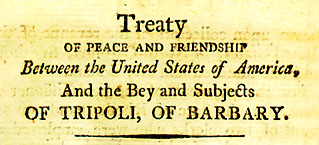
 John Adams
John Adams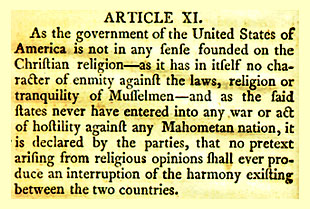 Article XI from the Treaty of Tripoli
Article XI from the Treaty of Tripoli 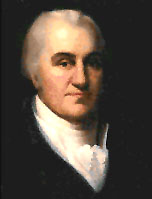 Joel Barlow, U.S. Consul General of Algiers
Joel Barlow, U.S. Consul General of Algiers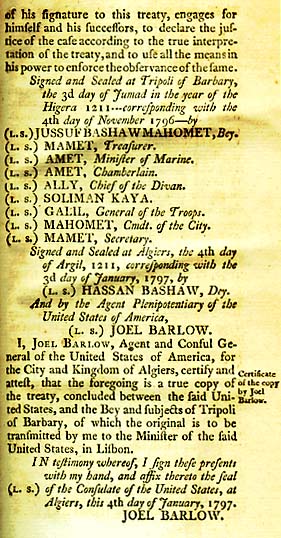 Signers of the Treaty of Tripoli
Signers of the Treaty of Tripoli 